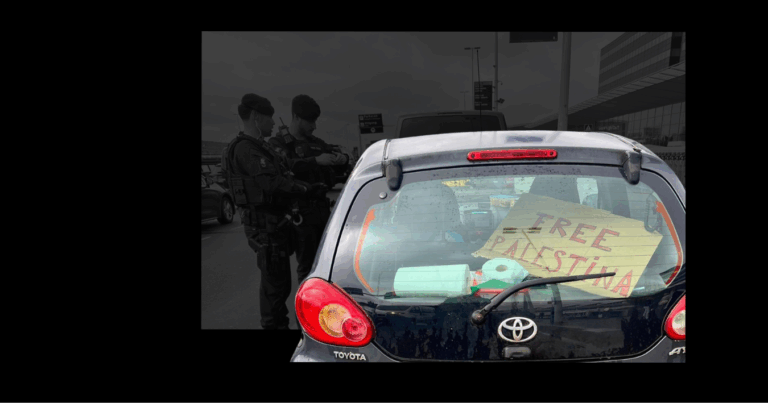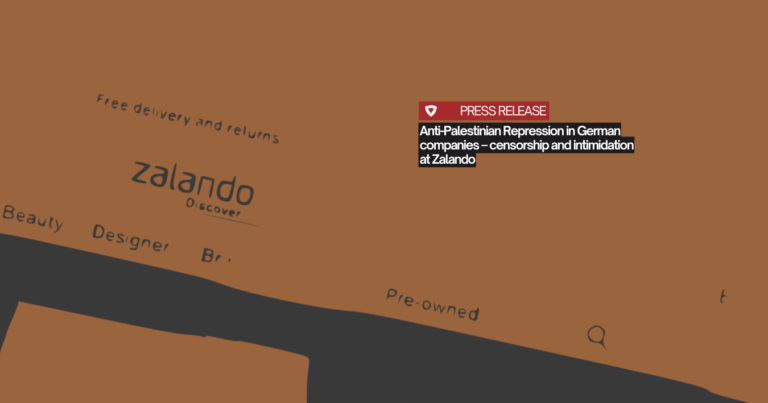Wise Case Launch: Challenging Financial Exclusion of Palestinians
Two Palestinian women residing in Italy have initiated proceedings against Wise Europe SA after their bank accounts were suddenly closed without notice or explanation. They are supported by the European Legal Support Center (ELSC) and legally assisted by the Brussels-based law firm Progress Lawyers Network (PLN). The case is now before the Court of First Instance of Brussels, where their legal team is seeking accountability for what we view as an unlawful and discriminatory action. This is not only a matter of contract law and consumer rights, but also about the systemic financial exclusion practiced against Palestinians in Europe and beyond.
The closures took place in October 2023, within days of the beginning of the genocide. Both women had maintained accounts with Wise for over a year, relied on them for their salaries and daily expenses, and had never been questioned about their activities. Without warning, they were locked out of their accounts, unable to access their own wages and left in precarious situations. For weeks, they tried to obtain answers through Wise’s internal channels, but the company responded only that it could not disclose information “due to the way we are regulated.” The accounts have never been restored. According to information confirmed by the clients and their lawyers, the affected individuals remain without access to their funds. To this day, Wise has not provided any clear grounds for its actions.
This is not an isolated case. Palestinians are facing a wider problem of financial exclusion, through a practice known as “de-risking.” De-risking refers to the decision by banks and payment service providers to deny services to whole categories of clients they perceive as “high-risk”, rather than assessing individual circumstances. Under international and European regulations, financial institutions are supposed to take a risk-based approach, applying proportionate measures where concerns exist. Yet, they often resort to blanket exclusions, treating people as suspect solely on the basis of nationality, country of origin, or political association
Concrete examples show how this plays out. Novara Media has reported that twenty Palestinians had their accounts with Wise and Payoneer suddenly terminated in the weeks following 7 October 2023 without any explanation. Between 2022 and 2025, the ELSC documented multiple cases involving Palestinians. Although each case is different, together they reveal a clear pattern.
The discriminatory character of such measures is clear. This reflects and reproduces wider political narratives that conflate Palestinian identity with suspicion or criminalisation. The result is not only the violation of basic consumer rights and anti-discrimination laws, but also the denial of essential services that are indispensable to ordinary life: receiving a salary, paying rent, or supporting family members.
The broader dimension of de-risking cannot be ignored. Palestinians in Europe already face a narrowing of civic and political space, including restrictions on their ability to express solidarity, organise, or challenge Israeli violations of international law. Financial exclusion amplifies this repression by undermining the very ability to function day-to-day. It is not simply an administrative inconvenience: being left without access to one’s salary or banking tools places individuals in conditions of insecurity and isolation. It also weakens community resilience. Similarly, civil society organisations facing de-risking lose access to financial infrastructure that is vital for advocacy, humanitarian work, and rights defence.
This case is addressing both the immediate injustice inflicted on the two Palestinian women and the structural problem of de-risking. Legally, our legal team argues that Wise breached its contractual obligations, abused its rights, violated mandatory consumer protections, and engaged in unlawful discrimination – considered the extensive de-risking practices implemented by Wise. Palestinians cannot be made to carry the burden of blanket risk assumptions, nor should financial institutions be permitted to obscure discriminatory practices behind technical references to regulation. Therefore, this case is also about the broader struggle against financial exclusion as a tool of control.
We are calling on Palestinians in Europe who have faced similar closures or restrictions from Wise to come forward. If you have been affected, we invite you to share your experience with us through the secure form that will soon be available on our website. Your testimony will help build a stronger record of how financial exclusion affects Palestinians and will support efforts to hold institutions accountable.







